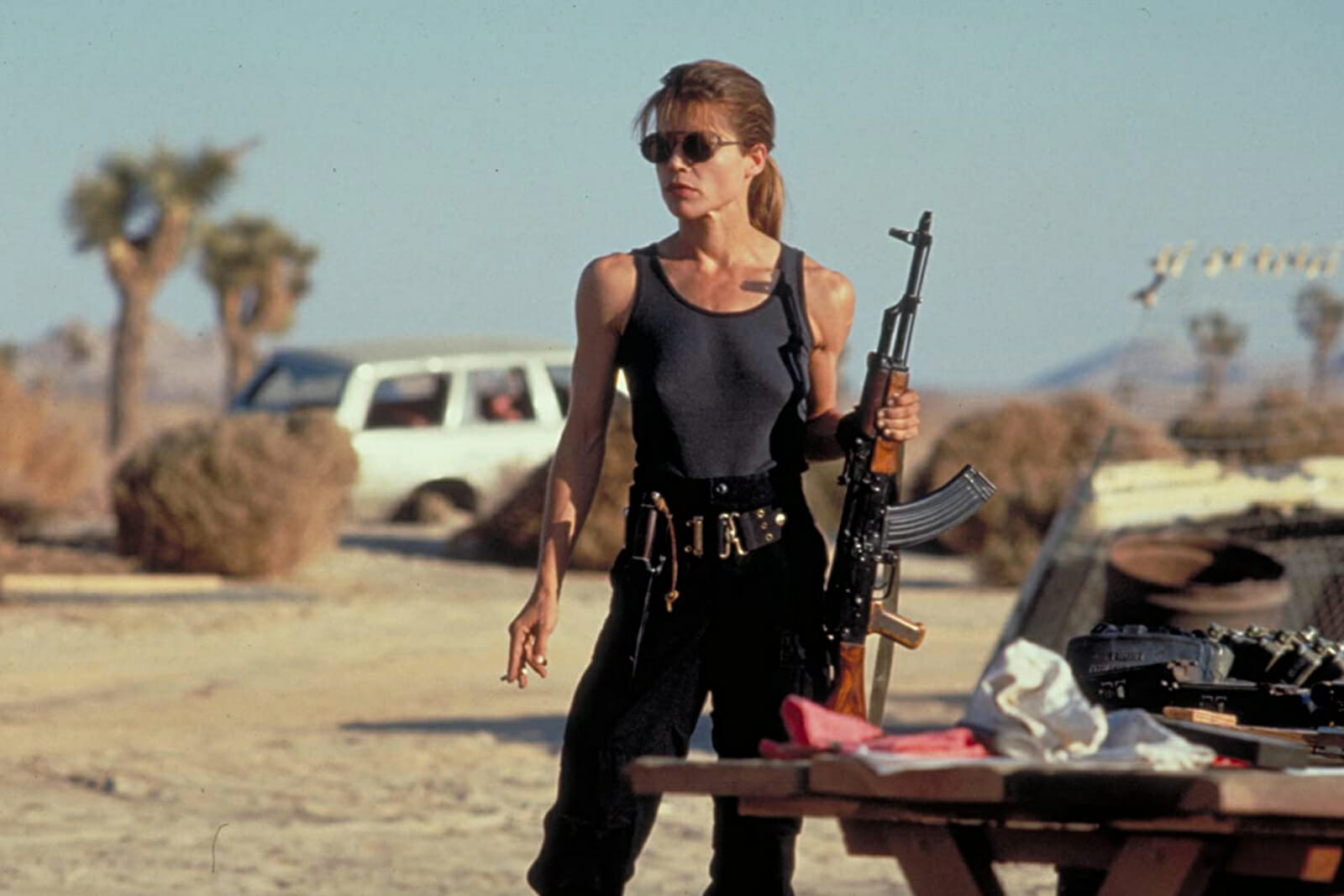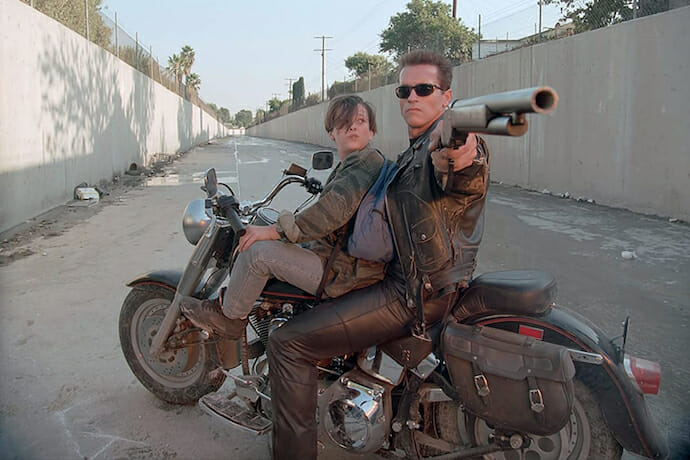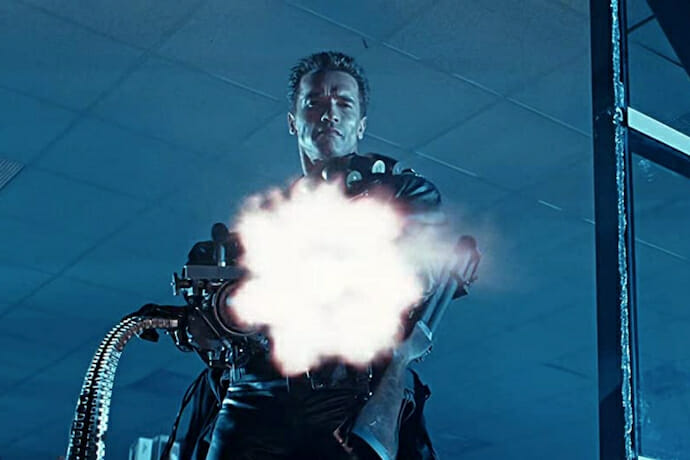
For its 30th Anniversary, I Convinced My Mom to Watch ‘Terminator 2: Judgment Day’ for the First Time
Almost 6 months to the day after I was born, the universe gifted me one of my favorite movies of all time, though I would not discover it until 13 years later: James Cameron’s classic sci-fi action sequel, Terminator 2: Judgment Day, or lovingly referred to T2 by many of its fans.
It’s hard to encapsulate why I love T2 so much. After all, there are movies that I loved when I was 13 that I’ve hardly revisited since. But T2 remains a touchstone in my life and I have watched it many times because it’s a movie that I’ve grown to appreciate over the years. I’m sure many others feel the same way. It’s one of the greatest sequels ever made, a singular improvement over its predecessor, one that expanded the world and mythology, opening up new possibilities.
It made Arnold Schwarzenegger’s Terminator the good guy. It grew Sarah Connor (Linda Hamilton) from an unassuming waitress-turned-mother of the future into a fierce warrior, a template that was so influential you can see her DNA in many of the subsequent cinematic action heroines of the past three decades. It introduced the terrifying new liquid-metal T-1000 (Robert Patrick) using state-of-the-art visual effects and some of the best action sequences ever captured. For 1990’s blockbusters, only the CGI in 1993’s Jurassic Park holds up better.
I was lucky enough to see it on the big screen when Cameron restored and released it in 3D in 2017, only adding to my appreciation of what a visual masterpiece the film is. It’s always near the top of my list to be added to the National Film Registry.
By the slimmest of margins against the monolith that is Titanic, T2 is actually my favorite James Cameron movie because it’s probably the tightest movie he’s ever made. No disrespect to Titanic, but nobody’s favorite part of that movie is the constant cutting back to the old lady talking. T2 has a constantly moving forward momentum that many films have since tried to emulate, but few have succeeded at.
And unlike my affinity for the Star Wars or Star Trek movie franchises, I’m not necessarily attached to the larger Terminator franchise. I have recently come to the conclusion that any extent that I can be considered a Terminator fan is purely based on my love of T2. I saw Terminator 3: Rise of the Machines shortly after watching T2 for the first time and have barely revisited it since. It just seemed to undo a lot of what made T2 work so well, and not having Sarah Connor back was a major strike against it.
My first Terminator movie in the theater was 2009’s Terminator Salvation. I convinced a high school pal to see it with me; 30 minutes into it, he was whispering and admitting that he hadn’t seen the previous Terminator movies, and asking me if that was important. And in the context of that movie: no, not really. It stars Christian Bale as John Connor in a mostly-standalone future-war flick that’s nearly two hours long.
I didn’t even bother to see the two most recent installments, 2015’s Terminator Genisys and 2019’s Terminator: Dark Fate, because I already knew what their biggest flaws would be: they’re not T2. In fact, the only other Terminator media outside of the first two movies that’s really resonated in my life is Terminator: The Sarah Connor Chronicles, the short-lived, but much-beloved TV series, which ran from 2008 to 2009.
The show starred Firefly alum Summer Glau as Cameron, a Terminator sent from the future to protect the titular Sarah, played by Lena Headey, who starred as Cersei Lannister in Game of Thrones, and John Connor (Thomas Dekker). If anything, the show succeeded because it was the closest to emulate the idea of what a James Cameron-esque Terminator TV show would look like. But the show took risks. For example, when the T-1000 finally showed up on the show, it was in the form of Shirley Manson from the rock band Garbage. Most importantly, Sarah and John felt like exactly where we left them.

But I think what made that show work is a lot of what makes T2 work. I was a late-teenager when the Sarah Conner Chronicles was airing, feeling moody and angst-ridden right when John Connor was the same age and feeling the same way. Similarly, the John Connor as depicted in T2, played by Edward Furlong, was the same age I was when I first watched it. He looked and talked like kids I knew. He copped an attitude; he occasionally acted like a brat; he made the Terminator stand on one leg.
Even today, bigger movies struggle to put in younger characters, but it can help provide a through-line, as it does in this film. John Connor didn’t seem to understand the weight of destiny, the cavalcade of coinciding events around him, but that’s okay. It made sense. He was a child, even if he sometimes had to act like the parent, such as when he saves his mother from killing Miles Dyson (Joe Morton) and subsequently tries to distract Dyson’s younger son from the Terminator’s gruesome revelation of its true cyborg self.
And about said cyborg: James Cameron claimed in a brilliant recent oral history of the film over at The Ringer, that he had “always loved The Wizard of Oz,” and that T2 “is about the Tin Man getting his heart.” Is this pinnacle Schwarzenegger? He really brings humanity to the Terminator here, and it might just be his best performance. He’s too over the top in things like Predator or Commando, too stilted in the first Terminator, and hamming it up too much in basically everything that followed. But there’s real power and resonance when he prepares to sacrifice himself at the end of the film by telling an emotional John “I know now why you cry, but it’s something I can never do…”
Oh, sorry, did I just spoil the movie? Well, if you’ve never seen it before, you resemble only one other person I know: my mom. Action movies are not really her thing, she has delayed and delayed watching it until now, only upon its 30th anniversary, will she give it a chance.
No, she hasn’t seen the first Terminator, and yes, we’re skipping it. I hadn’t seen it the first time I watched T2 either, and I don’t think she’d particularly like it.

Inspired by Patrick Willems, I’ve decided to ask her questions before and after watching it with her. In addition to just another chance to watch T2 again, I must admit that I am really curious to gauge her reaction to this iconic movie that I love so much. While James Cameron might think this is a story about a surrogate father who happens to be a robot, I happen to think it’s one of the best movies about a mom and her son ever made.
Before the movie:
What’s your general knowledge of the Terminator movies or franchise as a whole?
Zero, except for that Schwarzenegger’s in it. I know he’s a robot, and I know about “I’ll be back.”
Do you know anything about T2 in particular? What would you say is its reputation? I know you were busy with a 6-month-old, but do you remember its marketing, release, and initial reception?
Not really, except for what you’ve told me, that it’s the better movie. I remember “hasta la vista, baby,” that’s it. I was concerned with baby stuff at the time.
What are your expectations going into T2?
It’s not really my thing, and I have lived 30 years not watching it. These kinds of big Schwarzenegger blockbusters have not been very interesting to me over time. And at that time, I was a little preoccupied with a newborn. I just never felt any interest in going back.
After the movie:
What were your overall impressions? Did you like Terminator 2?
It’s still not my genre, but the characters do resonate. The Terminator character doesn’t have to be a robot from the future, he just has to be “other.” That’s why I immediately said at the end that he reminds me of Sydney Carton from Dickens’ A Tale of Two Cities. Carton is an “other” in that society. Carton is welcomed into the Manette family just like the Connor family welcomes the Terminator as their benefactor, but he is ultimately different from them. Sydney Carton is that same thing: he is not of them. Sydney Carton is the character I most think of in terms of this movie. Just like the Terminator, the least likely character is the one who protects the family. Just like Carton sacrifices himself out of love for Lucy Manette, the Terminator does it all for the preservation of John Connor. He never expects anything in return, he does it all for John Connor.
What was your favorite sequence in T2?
Probably one of the early ones where John Connor is trying to teach the Terminator how to be a human, so the stuff like when he’s trying to teach him slang or when he makes him swear not to kill anybody. And then, the next step, like when he looks down to see that, in shooting all those police officers at Cyberdyne, he has not killed any of them. Because that’s what he has promised, he’s living up to those promises, so he’s becoming that much more human.
Who gives the best performance in the film? The worst?
I have to give credit to Arnold Schwarzenegger. I also give credit to the actress who played Sarah Connor, she is the fierce mom. I thought the guy who played the T-1000 had the most difficult role in the movie. I think the boy who plays John does a good job of playing a juvenile delinquent; he’s not the sweet kid, so he plays that kid well. There were some canned performances in secondary roles, like at the mental hospital. I thought John’s foster parents were one-dimensional.
Do you find any overarching themes with it and the other James Cameron movies you’ve seen, such as Titanic or Avatar?
I don’t think that James Cameron’s ever going to be responsible for anything that is overtly feminist. I don’t like the idea of Sarah being portrayed for such a long time as this crazy person. I guess it serves the storyline, but I also see some sexualization there. She has no hips; she just looks like a sexualized person. It’s really clear James Cameron is involved in this.
From its villain, who appears to the public as a Los Angeles police officer in a movie released a year before the 1992 L.A. riots, to its depiction of nuclear war, is T2 a political text? Is it a feminist text?
I think it’s about how power exerts itself under the guises of the traditional power structures. That’s why the T-1000 has to take on the guise of a traditional power structure like a police officer. It’s just like how Sarah Connor is inconvenient, so she ends up at a mental hospital; the T-1000 is going to prevent her from being able to tell the world that Judgment Day is coming. All of those traditional structures are going to be used to prevent that message from getting out, that what’s coming is that the machines are going to win. That’s a bit of a feminist track, too, the idea that the traditional structures are going to be used against you.
This movie was the most expensive movie ever made at the time of its release and is considered a major milestone in visual effects, particularly with regards to CGI. It won 4 Oscars, in Sound, Makeup, Visual Effects, and Sound Effects Editing. Do they still hold up?
Yeah, I think the liquid metal thing holds up. The audio is pretty impactful. So, yes, I’d say so.
What is your least favorite aspect of the film? What criticisms do you have of it?
I can’t point to anything specific. I think that within the concept, I think the movie made sense, I think all the pieces made sense. There wasn’t extraneous stuff.
***
There you go: whether you’ve seen it countless times like I have, or have never seen it like my mom had, now is the perfect time to ring in the 30th anniversary of Terminator 2: one of the best sequels, sci-fi movies, action movies, and overall any kind of movies ever made.
